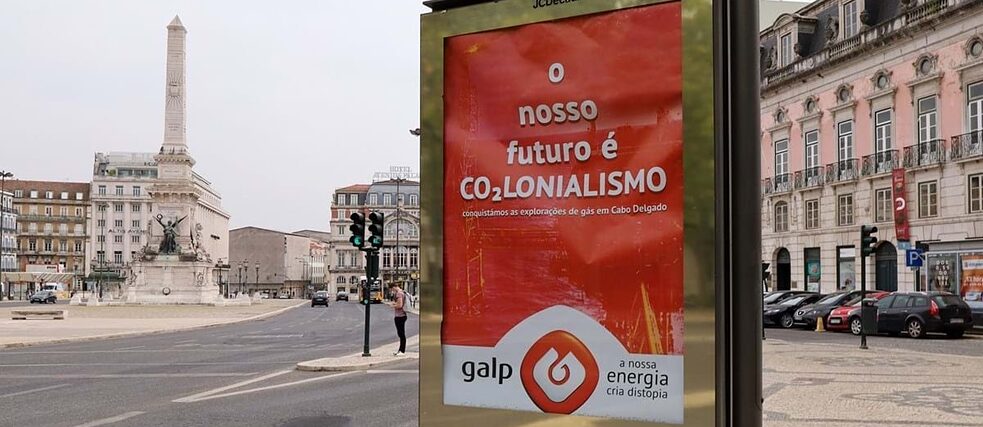CO2lonialism
What does colonialism have to do with climate justice?

When I first started looking at the implications of the climate crisis, my view of the problem was very limited. I felt like I was faced with a huge math problem: A temperature increase of 1.5 degrees Celsius has to be avoided - by reducing emissions - at all costs by 2100. But I soon realised that the climate crisis cannot be compared with a simple math problem. For if we want to save our planet, we must also address social justice and dismantle co2lonial and imperialist structures.
By Matilde Alvim
Behind the term climate justice lies the idea that there are prime culprits for this global climate crisis. These are large, multinational corporations that exploit fossil fuels, on the one hand, and banks and governments that participate in these processes, on the other. These global players, mostly from Europe or the US, are interested only in a profit-driven economy that generates wealth and power without any regard for people and the environment. Does this description ring strangely familiar to you? Capitalism has its roots in colonialism, which helped European states achieve territorial and economic dominance and accumulate wealth. Colonialism may no longer exist formally, but in reality it has merely found ways to disguise itself cleverly.
HOW A CAMPAIGN GENERATED ATTENTION
We use the term "CO2lonialism" to refer to fossil colonialism. By and large, the term refers to the exploitation of fossil fuels in the Global South by companies from the Global North. These activities foster the climate catastrophe and perpetuate the colonial, extractive model. Cabo Delgado in Mozambique is a case in point. The region, which has fossil natural gas, has been plagued by extreme militarization, terrorist attacks, and climate disasters in recent years. Communities that live there have been forced to leave their land as a result. A graph published by the international activist collective Gastivists, shows that European insurance companies, corporations, and banks are primarily to blame for this political chaos because they lay claim to the ninth largest gas reserve in the world. These include the Portuguese fossil fuel company Galp, the Portuguese bank Millennium BCP, and the Portuguese construction company Mota-Engil.Following the terrorist attacks in March, Portugese media reported extensively on the situation in Cabo Delgado. The public debate that ensued paid little attention to the responsibility Galp bore in this context, however. Shortly thereafter – already in April 2020 - Climáximo, together with other organisations, conducted the "Galp Must Fall" campaign. This made Galp's colonialist actions transparent in Mozambique as well as in other former Portuguese colonies. Through my participation in this action, I realised how important the anti-colonial focus was in bringing many different people together for a "twitter storm" and incredible Instagram lives with artists from PALOP (Portuguese-speaking African) countries. As a call to action for the digital Strike, FFF partnered with Justiça Ambiental Mozambique to release a mobilisation video. In this video, activist Kate explains, "In Mozambique, the communities of Cabo Delgado are up against the Galp company, which wants to exploit gas on their land. This extractivist and colonialist project cannot continue. JA! reclaims the rights of these communities and of nature." On 1 April 2021, fake Galp posters with the words "Our Future is Co2lonalimus" appeared in Lisbon. They were part of the Gastivists' "Clean Gas is a Dirty Lie" campaign, which also involved organisations from Mozambique, such as JA! and highlighted Galp's role in the climate crisis.
Solidarity with the global south
But C02 colonialism is not only noticeable in Mozambique. Its structures must be smashed by the inhabitants of the Global South with all the solidarity of the population of the Global North. At the World Social Forum in January 2021, I presented the Glasgow Agreement together with Jawad Moustakbal of ATTAC/CTDM Morocco. In that presentation he said:
"Our mission as people from the Global South is not only to catch up with so-called "Western modernity," but above all to fix and overcome the problems created by Western civilisation. It is up to us to support other people in the Global South, (...) and to transmit to them our traditional knowledge of living together with each other and with other living beings on Earth."
Thus, the more I involved I got in activism, the more I realised how closely interconnected the structures of capitalism and colonialism are. As an activist of the Global North, I see it as our duty to show solidarity with the organisations that want to fight for justice for their communities.
In the next blog article, Belén and Carmen will elaborate on the issue of climate refugees of the Global South. This issue cannot be viewed in isolation from colonialism either.